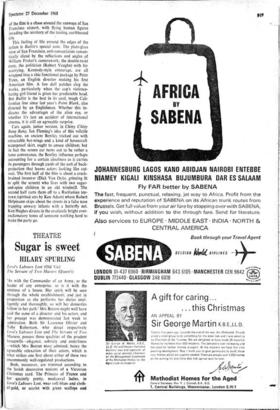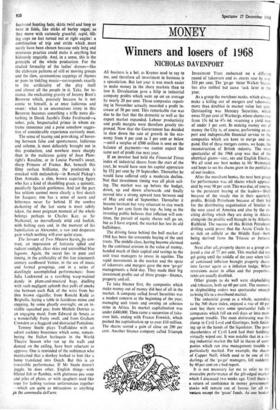Love's Labours Lost (Old Vic)
THEATRE
Sugar is sweet
HILARY MAILING
'As with the Commander of an Army, or the leader of any enterprise, so is it with the mistress of a house. Her spirit will be seen through the whole establishment; and just in proportion as she performs her duties intel- ligently and thoroughly. so will her domestics follow in her path.' Mrs Beeton might well have said the same of a director and his actors, and her precept was demonstrated last week to admiration. Both Sir Laurence Olivier and Toby Robertson, who direct respectively Love's Labours Lost and The Servant of Two Masters, possess those qualities of the prudent housewife--elegance, sobriety and orderliness —which Mrs Beeton most admired; hence the agreeable relexation of their actors, which is what strikes one first about either of these two uncommonly well-regulated productions.
Both, moreover, are trimmed according to the lavish decorative notions of a Victorian Christmas card. The Princess of France and her quaintly pretty, mediaeval ladies, in Love's Labours Lost, wear soft blues and'cloth- of-gold, or scarlet with green scallops and
The Servant of Two Masters (Queen's)
feathered hunting hats; skirts twirl and loop or twist in folds, like sticks of barley sugar, as they move with curiously graceful, rapid, tilt- ing steps on feet turned out at right angles: a combination of trip and stride which ...must surely have been chosen because only long and strenuous practice could make it anything but hideously ungainly. And, in a sense, this, is the principle of the whole production. For the studied formality of the ladies' dresses—like the elaborate patterns of still or moving groups and the slow, ceremonious cappings of rhymes or puns to tinkling music—corresponds exactly to the artificiality of the play itself and almost all the people in it. Take, for in- stance, the enchanting gravity of Jeremy Brett's Berowne which, precisely because he is not comic to himself, is at once ludicrous and sweet: what is an unconscious irony in this Berowne becomes something a trifle more dis- turbing in Derek Jacobi's Duke Ferdinand—a sober, pale, bespectacled prince in whom ex- treme innocence and a poise somehow sugges- tive of considerable experience curiously meet.
The sense of teasing and provoking, of hover- ing between false and spontaneous, ludicrous and solemn, is most delicately brought out in this production, and nowhere more sharply than in the malicious gaiety of Joan Plow- right's Rosaline, or in Louise Purnell's sweet, sharp Princess of France. But, 'beneath this filmy surface brilliance, the production is streaked with melancholy—in Ronald Pickup's Don Armado, a slim, brown capering figure who has a kind of shambling grace, a quixotic, peculiarly Spanish gentleness. And yet the part has seldom seemed more clearly a first sketch for Jacques; one has a sense of scorn and bitterness never far behind. If the sombre darkening of the last scene is most subtly taken, the most poignant moment of the whole belongs perhaps to Charles Kay, as Sir Nathaniel, so marvellously mild and foolish, with bolting eyes and, in the moment of his humiliation as Alexander, a raw and desperate pain which nothing will ever quite erase.
The Servant of Two Masters leave y con- trast, an impression of fantastic s and radiant sunlight, clear skies and untroubled blue lagoons. Again, the secret lies in race and timing, in the artificiality of this late nineteenth century cardboard Venice, in the use of music and formal groupings, and in a series of dazzlingly accomplished performances: from Julia Lockwood as a ravishing wasp-waisted dandy in plum-and-mustard bags, duelling with such negligent aplomb that puffs of smoke rise between each flick of the wrist from her thin brown cigarillo; from Ronald Radd as Brighella, laying a table in fastidious mime and stepping, by some ghastly oversight, on an in- visible squashed pea; from Michele Dotrice as an engaging maid, from Edward de Souza as a wonderfully fruity swell, and from Graham Crowden as a haggard and distracted Pantalone.
Tommy Steele plays Truffaldino with an adroit cockney breeziness which some, remem- bering the Italian harlequin in the World Theatre Season who ran up the walls and danced on the ceiling, have been reluctant to approve. One is reminded of the nobleman who maintained that a donkey looked to him like a horse translated into Dutch. But this is an irresistible performance. If Mr Steele doesn't juggle, he does other, English things—with filleted fish or flambee, with glutinous pea soup and piles of plates, or with spaghetti used like rope for lashing various unfortunates together —which are quite as miraculous as anything lin the commedia dell'arte.



































 Previous page
Previous page